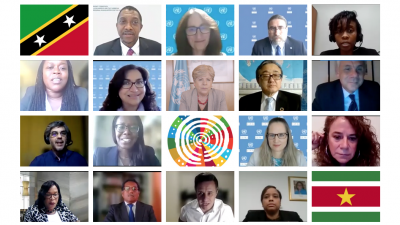Comunicado de prensa
Regional workshop for Latin American and Caribbean countries presenting their voluntary national reviews in 2022
This year, eight Latin American and Caribbean countries will formally present their Voluntary National Reviews (VNRs) during the United Nations High-level Political Forum on Sustainable Development (HLPF) in July 2022: Argentina, Dominica, El Salvador, Grenada, Jamaica, Saint Kitts and Nevis, Suriname, and Uruguay.
Within the framework of the fifth meeting of the Forum of the Countries of Latin America and the Caribbean on Sustainable Development, which took place from March 7 to 9, 2022 in San José, Costa Rica in a hybrid format, the Economic Commission for Latin America and the Caribbean (ECLAC) and the United Nations Department of Economic and Social Affairs (UN DESA) organized a virtual regional workshop on Tuesday, March 8, 2022 mainly orientated towards these eight countries.
Background
The countries of the LAC region have appropriated the 2030 Agenda for Sustainable Development as a State commitment, in broad cooperation with multiple actors, including civil society, youth, the private sector, academia, local authorities and legislative and parliamentary authorities, among others. Between 2016 and 2021, 28 of the 33 countries in Latin America and the Caribbean reported their progress in the ownership, monitoring and implementation of the 2030 Agenda and the SDGs with the presentation of at least one VNR at the HLPF. Of these 28 countries, 14 countries presented a VNR on more than one occasion (Argentina, Bahamas, Chile, Colombia, Costa Rica, Dominican Republic, Ecuador, Guatemala, Honduras, Mexico, Panama, Paraguay, Peru, and Uruguay).
Despite the multiple challenges posed by the impact of the COVID-19 pandemic in the region, the commitment and sustained effort of the countries to ensure the follow-up of the 2030 Agenda and the 17 Sustainable Development Goals (SDGs) remains very solid: 20 countries of the region have submitted their VNRs to the HLPF between 2020 (Argentina, Barbados, Costa Rica, Ecuador, Honduras, Panama, Peru, Saint Vincent and the Grenadines, and Trinidad and Tobago) and 2021 (Antigua and Barbuda , Bahamas, Bolivia, Colombia, Cuba, Guatemala, Mexico, Nicaragua, Paraguay, Dominican Republic and Uruguay).
While the 2030 Agenda continues to be the roadmap for a sustainable post-pandemic recovery, the VNRs continue to be the main mechanisms for reviewing the progress and challenges in the implementation of the 2030 Agenda at the national level and allow accounting for the trajectory and the strategies of each country. They also generate opportunities for peer learning and collective reflection on common or cross-border challenges of sustainable development. The emergence in the region of a series of Voluntary Local Reviews (VLRs), innovative exercises that express the commitment of actors at the sub-national, municipal and local levels with the 2030 Agenda, also constitute a tool for appropriation of the 2030 Agenda and complement national monitoring and review efforts.
Goal of the workshop
The main goal of the workshop was to strengthen the knowledge, peer learning and capacities of the countries of LAC for the elaboration and preparation of VNRs, as part of their strategy for the implementation and national follow-up of the 2030 Agenda for Sustainable Development. Furthermore, it was designed to strengthen the space and the regional dimension of the process of preparing the VNRs towards their presentation to the HLPF and to identify the common challenges of the countries of the region as well as solutions to overcome them.
Methodology
The workshop included interactive sessions on national efforts to prepare for VNRs and follow-up to the 2030 Agenda in the current context of the COVID-19 pandemic. Specific areas were discussed, such as the strategies and roadmaps for the fulfillment of the 2030 Agenda in all its dimensions in the medium and long term, the importance of the territorialization of the SDGs, and progress on statistical monitoring processes, among others. The lessons learned from the VNR presentations made between 2016 and 2021 were addressed, as well as the key messages that emerged from the Community of Practice. Additionally, the VNRs were reflected on as a tool to rebuild better in the face of the pandemic and accelerate action for the SDGs within the framework of the Decade of Action.
The workshop was held in a spirit of peer learning by encouraging the exchange of concrete experiences from the participating countries. Countries were invited to give presentations based on guiding questions, which were followed by interactive discussions to encourage dialogue and exchange among all participants.
Participants
The workshop was attended by more than 100 representatives of twenty governments of Latin American and Caribbean countries, representatives of DESA and ECLAC, Resident Coordinators of the United Nations system and representatives of their offices, and other officials of the United Nations system, as well as other actors, including civil society..
Outcomes
Outcomes of this workshop include:
• Greater regional dialogue, peer learning and exchange of good practices in the formulation, dissemination and presentation of VNRs in different national contexts, as well as in the national responses to the COVID-19 pandemic and its interlinkages with the implementation of the 2030 Agenda.
• Strengthening of the capacities of the participants to link the VNRs with the national long-term implementation strategies of the 2030 Agenda, link subnational and local efforts and identify their contribution to the VNR process.



